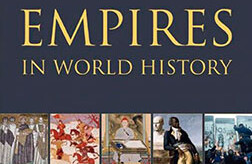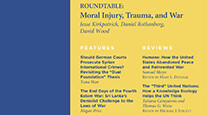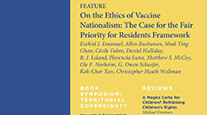Empires in World History: Power and the Politics of Difference, Jane Burbank and Frederick Cooper (Princeton, N.J.: Princeton University Press, 2010), 528 pp., $35 cloth, $24.95 paper.
Eva Marlene Hausteiner (Reviewer)
Recent books on empires—and there have been many—often have quite straightforward titles. Famous examples include Michael Doyle's Empires (1986), Niall Ferguson's Empire (2003), Herfried Münkler's Empires (2008), and Timothy Parsons's The Rule of Empires (2010). Jane Burbank and Frederick Cooper's Empires in World History is no exception. One reason for this might be that the concept of empire is still not fully established in the scholarly vocabulary when it comes to describing the present. Speaking of empires in the past is widely accepted, but imperial structures as recurring and even contemporary political phenomena are still highly debated. The endeavor of bringing empire back in as a transhistorical concept of heuristic value, complementing existing notions of political order, such as the nation-state, and going beyond the analysis of imperialism, is far from concluded.
In addition, theory building on how imperial systems work beyond the aspect of aggressive expansion is still ongoing and is likely to pose an exciting challenge to historians and political scientists for years to come. Empires in World History, by two New York University historians, is an impressive volume that significantly contributes to our understanding of imperial politics and dynamics and of the way they continue to shape history.
Burbank and Cooper present imperial history by providing a concise overview of a number of imperial formations, from classical Rome to the United States. The impact of these empires beyond their own borders, however, becomes most clear in the chapters devoted to inter-imperial comparisons and the intersections between synchronous empires. Cooper is an eminent expert on African colonial history, Burbank an equally central figure in the study of the Russian empire, but the book's scope is not restricted to the authors' respective academic backgrounds and areas of expertise. On the contrary: the Mongol empires, for example, play a central role in their argument because of "the connections they made across Eurasia and the imperial technologies they adapted, transformed, and passed on to later polities" (p. 93). Additional cases examined include the Ottoman Empire, Spain, China, and the United States, among others. The examples of continental tsarist Russia and British overseas rule are particularly instructive in their diverging characteristics, as well as in the ambivalent mark both have left on their postimperial spaces.
Behind the textbook-like composition—the twelve central chapters provide a brilliant overview of imperial history, with reading suggestions instead of footnotes—lies a conceptually sophisticated systematization, offering many insights to the more advanced reader. Empire is defined as a specific type of state, rather than categorically distinct from European ideas of statehood. What distinguishes imperial states from Westphalian nation-states is the absence of a closed notion of sovereignty, in which the Weberian markers of modern statehood (territoriality, monopoly on violence, and bureaucracy) coincide. Instead, Burbank and Cooper speak of "layers of sovereignty," thereby highlighting the complexity of imperial power structures. This complexity goes beyond binary perspectives of political inclusion or exclusion, and seems particularly instructive in an age in which many political scientists recognize the conceptual deficiencies of ideal models of sovereign states. Conceiving empire as a phenomenon of sovereignty, albeit "shared out, layered, overlapping" (p. 17), is far more illuminating than the binary distinction between center/metropolis and periphery/colony, which is still dominant in empire theory.
Perhaps the most useful concept the authors employ to compare and analyze imperial constellations throughout history is that of "repertoires of power," which they define as the flexibility and pragmatic application of diverse policies and arrangements of power to no less diverse populations and conditions. Burbank and Cooper show that in the imperial longue durée empires make full use of a remarkably wide range of political options when trying to integrate, stabilize, and expand their political influence, largely in reaction to internal and external challenges. The policy area that keeps imperial elites perpetually on their toes is what the authors call the "politics of difference": diverse populations and native elites require a constant reconfiguration of imperial power, and different empires have reacted differently to these challenges—by using coercion, the attractions of imperial ideologies, or other sources of power to battle centripetal forces. This implies that, when empires interact or clash, the conflicts are rarely symmetrical, because each empire uses different modes of power at different times. An expansionist empire with highly secured borders might clash with one in a stage of peaceful incorporation and integration. Empires are never alike, because they use different repertoires of power in very diverse ways, which is why their interactions are much more complex than those of nation-states.
What is interesting about empires, according to the authors, is not just their rise, decline, and fall but how they manage to maintain their power in the centuries in between. Another, so far underestimated, aspect highlighted by Burbank and Cooper is that these stabilizing power repertoires are apparently passed on in history; imperial elites benefit from the transmission of imperial knowledge. Political solutions for specifically imperial problems enter the repertoire that elites can revert to; the most popular lessons in this transepochal handbook of imperial politics are still those from the Imperium Romanum.
The implications for the international, or rather global, arena are obvious: With their universalist tendency to expand, empires reach out far beyond their original center. Wherever and whenever they reach their frontier, another competing empire is never far off, as Burbank and Cooper convincingly demonstrate. Whereas some of these inter-empire contacts result in costly conflicts, in many cases imperial elites and local intermediaries try to establish complex, more sustainable imperial interaction. Empires can be sources of both conflict and stability.
The toll that imperial politics have taken on immense numbers of people throughout history through repression and wars is by no means understated by Burbank and Cooper. Their goal to evaluate— despite all imperial cruelties—the stabilizing capacity of empires on a regional and global level, and the productivity of imperial intersections, is not an attempt to redeem the notion of empire. Instead, Empires in World History provides a balanced, even-tempered, and extremely rich perspective on a concept that is once again causing heated discussions, and which deserves to enter our analytical vocabulary of international and global politics.
—EVA MARLENE HAUSTEINER
Eva Marlene Hausteiner is a political scientist at the Collaborative Research Centre "Transformations of Antiquity" in Berlin and teaches at Humboldt University's Institute of Social Sciences. She is currently writing her Ph.D. dissertation on the Roman Empire as a legitimizing resource for British imperial discourse in the late nineteenth century.



